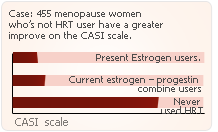
Estrogen and progesterone hormones are often included as part of hormone replacement therapy. Hormone replacement therapy has become very popular among women suffering from postmenopausal side effects. Due to widespread controversies about the pros and cons of estrogen and progesterone hormones use, many studies have been conducted. A specific concern that has recently arose, is whether or not the use of postmenopausal estrogen and progesterone hormones affect the cognitive abilities of users. To determine the validity of this hypothesis, this study was conducted.
The relationship between estrogen and cognition (awareness, perception, reasoning and judgment) is both controversial and uncertain. To get a better understanding of the connection between estrogen and cognition, an observational study was performed on 837 Japanese American women. All participants were 65 years or older and lived in Washington state. The women were measured at baseline for cognitive performance by examinations using the Cognitive Abilities Screening Instrument (CASI). A two-year follow up was also included.
progesterone case

Approximately half (455) of the women included in this observational study had never used estrogen or progesterone hormones to relieve menopause symptoms at any time since menopause. 186 women had used estrogen in the past, 132 women were current estrogen users and 64 women were presently/currently taking estrogen - progestin combination therapy.
Adjustments were made for age, education level, language spoken at the interview for this study, type of menopause (natural or surgical) and the baseline CASI score. The results found that women who had never used estrogen for post menopause symptoms had improved slightly on the CASI scale. The change was greater for current estrogen users and worse for present estrogen - progestin combination users in comparison with the women who never used estrogen.
The ultimate conclusion supports that there is a modest beneficial association with current estrogen use and the rate of cognitive change in women that were looking for relief from menopause symptoms. A negative association was also observed between estrogen - progestin combination use and the rate of cognitive change.
This study also showed that progesterone hormones had the opposite effect of estrogen hormones. As estrogen has a proposed beneficial influence on cognitive performance, progesterone hormones may actually have a negative influence on brain structure and function.
Though the results of this study serve to show some of the positive of only estrogen hormone replacement therapy (not estrogen - progestin combinations) and the negative effects of progesterone hormones on cognitive performance, more long term research is needed. In order to apply this information to a clinical setting, data from larger and longer-termed randomized trials are needed.